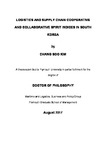LOGISTICS AND SUPPLY CHAIN COOPERATIVE AND COLLABORATIVE SPIRIT INDICES IN SOUTH KOREA
| dc.contributor.supervisor | Dinwoodie, John | |
| dc.contributor.author | Kim, Chang Soo | |
| dc.contributor.other | Plymouth Business School | en_US |
| dc.date.accessioned | 2017-08-15T14:59:01Z | |
| dc.date.issued | 2017 | |
| dc.identifier | 10509682 | en_US |
| dc.identifier.uri | http://hdl.handle.net/10026.1/9827 | |
| dc.description.abstract |
Logistics and supply chain cooperative and collaborative spirit indices in South Korea This study proposes criteria to diagnose, to analyse and to evaluate the extent of cooperation and collaboration between supply chain members within extensive inter-firm relationships in supply chains. A case study context examines cooperative and collaborative relationships between shipping companies and shippers as suppliers, manufacturers, distributers, retailers, exporters and importers. The components of cooperation and collaboration are analysed through literature reviews, interviews with industrial experts, content analysis, two-rounds of Q-sorting, and pilot testing. Cooperation is a subset of collaboration comprised of transparency, fairness, and mutuality, and cooperation and “relational strength” such as trust and sustainability constitute collaboration. A questionnaire survey generated 167 responses from shipping companies in South Korea. Exploratory factor analysis underpinned cooperative and collaborative spirit indices (CCSIs) that varied within the shipping industry, types of shipping registered, and vessel types. Confirmatory factor analysis supported good model fit, convergent and discriminant validity, and unidimensionality. A “target coefficient” identified second order factors and path analysis showed that fairness, mutuality and cooperation can foster trust, and mutual trust can cultivate sustainability although transparency does not necessarily lead to trust. CCSIs indicated modest cooperation and collaboration in the shipping industry and MANOVA revealed differences according to vessel types and contract periods. This research clarifies theories of cooperation. Enhanced CCSIs between shippers and shipping companies imply that shippers should extend two-way communication, mutuality, distributive fairness and sustainability with shipping companies. Maintaining relationships brings long run benefits. Further, shipping companies should continuously strive to gain trust from shippers and government should organise consultative groups, develop and disseminate exemplary cases and foster institutions to promote collaboration. The constructs and items deployed herein are generic, implying that the research model and CCSIs methods will be widely applicable. | en_US |
| dc.language.iso | en | |
| dc.publisher | University of Plymouth | |
| dc.subject | Inter-firm cooperation and collaboration in SCs through CCSIs | en_US |
| dc.subject.classification | PhD | en_US |
| dc.title | LOGISTICS AND SUPPLY CHAIN COOPERATIVE AND COLLABORATIVE SPIRIT INDICES IN SOUTH KOREA | en_US |
| dc.type | Thesis | |
| plymouth.version | publishable | en_US |
| dc.identifier.doi | http://dx.doi.org/10.24382/439 | |
| dc.identifier.doi | http://dx.doi.org/10.24382/439 | |
| dc.rights.embargodate | 2018-08-15T14:59:01Z | |
| dc.rights.embargoperiod | 12 months | en_US |
| dc.type.qualification | Doctorate | en_US |
| rioxxterms.version | NA |
Files in this item
This item appears in the following Collection(s)
-
01 Research Theses Main Collection
Research Theses Main


